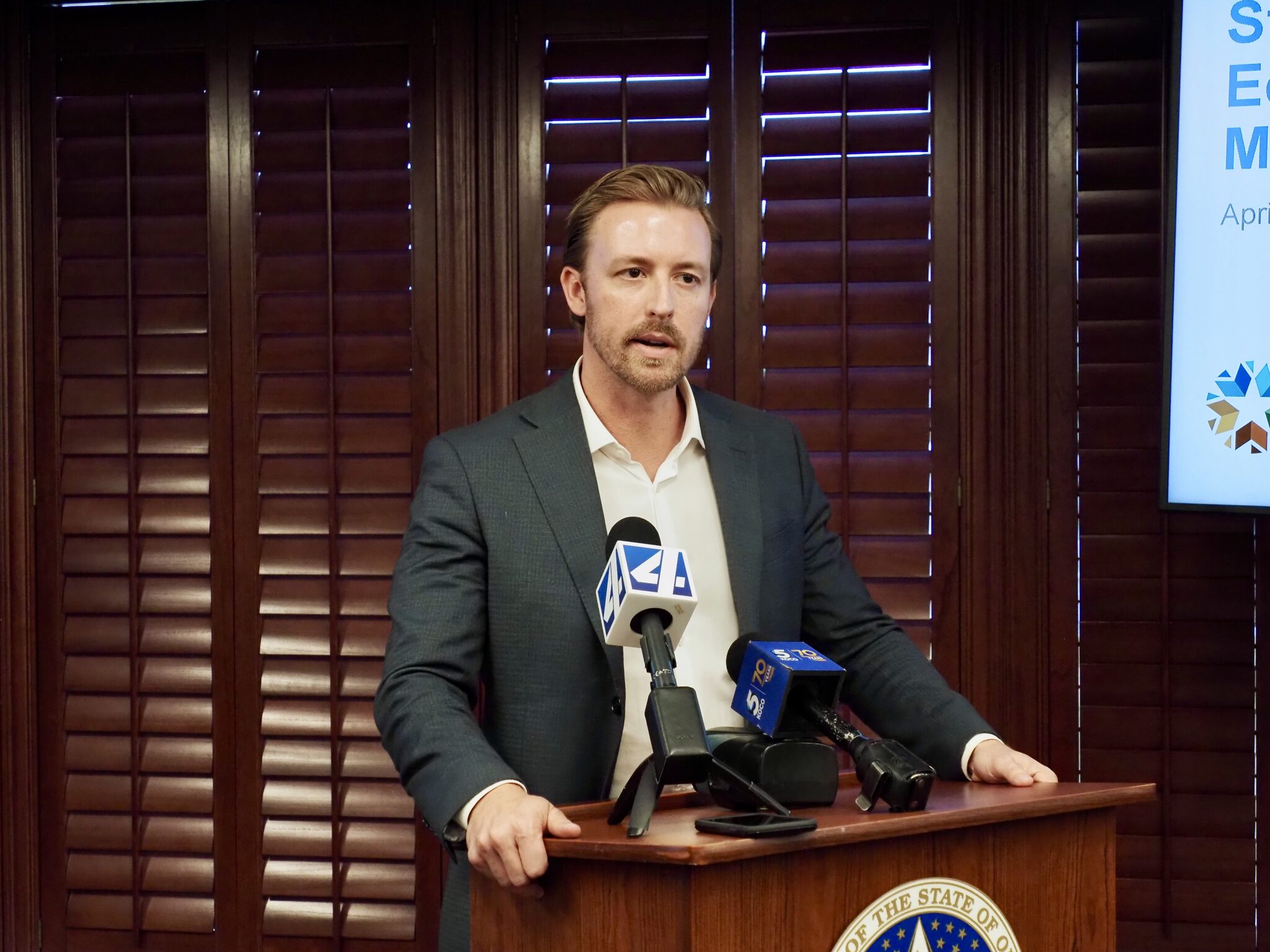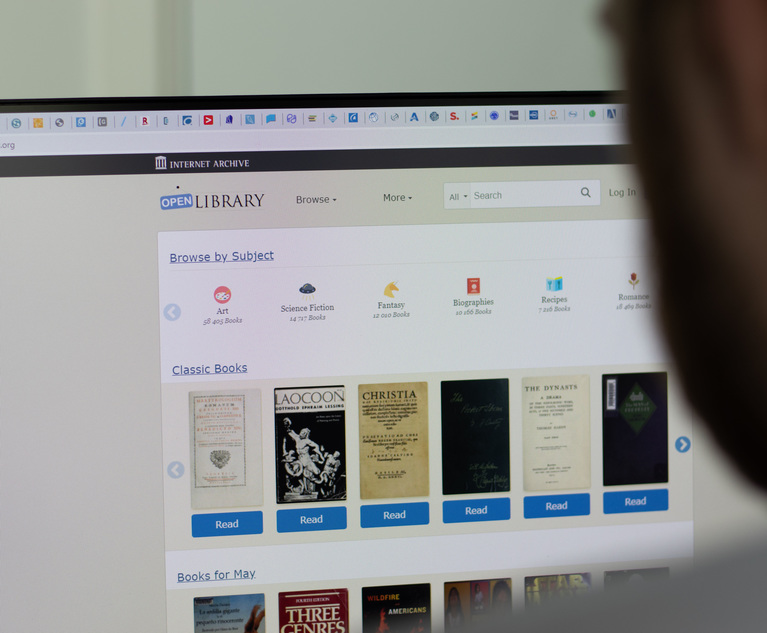
Oklahoma State Superintendent Ryan Walters, pictured April 25, said he aims to end “sanctuary schools” by requiring students to provide proof of U.S. citizenship or legal immigration status. Schools would have to record the number of undocumented students they enroll, under Walters’ proposal. (Photo by Nuria Martinez-Keel/Oklahoma Voice)
OKLAHOMA CITY — A proposed rule from the Oklahoma State Department of Education would force public schools to ask for proof of U.S. citizenship or legal immigration status while enrolling students, a policy that could contradict federal law if passed.
The suggested rule also would require school districts to record the number of undocumented students enrolled and report the information to the state Education Department. Students would not be identified personally, according to the rule proposal, but the agency has not explained what it would do with the information.
Undocumented students still would be able to attend public schools in Oklahoma, but the proposal has raised concerns that it could dissuade families from enrolling their children in school.
State Superintendent Ryan Walters, who leads the Education Department, said his administration suggested the policy as a way to end “sanctuary schools” in Oklahoma, though his spokesperson declined to say what that term means.
Walters said the rule would correspond with President-elect Donald Trump’s goal of curbing illegal immigration.
“Every state should follow our lead,” Walters said in a video posted to social media Tuesday.
The text of the proposed rule states the policy would assess current and future needs for programs teaching English as a second language, transportation services and school funding. It also aims to gauge “language and cultural barriers.”
Families would have to provide a U.S. birth certificate, U.S. passport, driver’s license, an unexpired permanent resident card or another document proving the student has legal authorization to live in the country.
The Oklahoma policy is one of seven new proposals for changes to the Education Department’s administrative codes, which have the force of law.
Other suggested rules would slash references to cultural diversity and equity from the agency’s rulebook and would require Oklahoma teachers to pass the U.S. Naturalization Test to earn or renew their educator certification.
The rule changes would need approval from the Oklahoma State Board of Education and consideration from the state Legislature before being implemented. The Education Department is accepting written public comment on the rules through Jan. 17.
Members of the public will be able to comment on the immigration status rule in a Jan. 17 hearing beginning at 11 a.m. at the Education Department’s headquarters in Oklahoma City.
Although public schools are allowed to require proof of residency within a school district, the federal government prohibits schools from asking students for their immigration status, deeming it unnecessary and a potential “discouraging effect” on enrollment.
Advocates from Oklahoma City’s Latino community say the rule would instill greater fear in immigrant families, harm vulnerable children and do nothing to improve academic outcomes.
The rule would inflict “psychological warfare” on immigrants, said Gloria Torres, executive director of Calle Dos Cinco, a nonprofit boosting community development in the majority-Latino Historic Capitol Hill district.
Schools don’t need to know children’s immigration status to understand their language proficiency or other educational needs, said Torres, formerly a teacher, principal and Oklahoma City Board of Education member.
She said collecting immigration details would turn schools into a place these families will be afraid of.
“As educators, our role is to provide an education, to provide that safe learning environment,” Torres said. “This proposed rule goes against everything that we have learned about building trust with our families, with our kids.”
A spokesperson for the state Education Department, Dan Isett, did not respond to questions asking how the proposed rule would materially improve instruction, nor would he say whether the agency has any concerns about deterring families from enrollment.
“Supt. Walters is committed to protecting Oklahomans from unfunded mandates, including the taxpayer burden imposed by the Biden administration’s failure on border policy,” Isett said. “A critical step in that process is to get the best possible information about the depth of the problem.”
Isett did not clarify whether Walters believes education of undocumented children is an unfunded mandate on public schools.
Oklahoma funds its public schools based on the number of children enrolled, and the federal government provides additional money and resources, including for English learners.
Rep. Arturo Alonso-Sandoval, D-Oklahoma City, said alienating immigrant students risks creating an “underclass and uneducated population,” harming the state as a whole.
“We want kids to get a good education, grow up and eventually be people that contribute to the economy, to the workforce and ultimately make Oklahoma a better state because that benefits everyone,” Alonso-Sandoval said. “Students not having access to education benefits no one.”
The U.S. Supreme Court decided in 1982 that states cannot deny undocumented children equal access to public education. The Court found no evidence showing the exclusion of these students from public schools would stop illegal immigration nor that it was likely to improve the quality of public education overall.
A majority of the Court agreed that excluding these children “does not comport with fundamental conceptions of justice.”
Alabama attempted to require schools to verify students’ immigration status in a sweeping 2011 immigration law. Many of the law’s provisions, including student citizenship checks, were overturned as a result of a federal lawsuit.
However, absenteeism and withdrawals from Alabama schools substantially increased among Hispanic students after the law passed, the U.S. Department of Justice said.
Alonso-Sandoval, a first generation Mexican-American, said immigrants positively contribute to Oklahoma’s economy by filling essential jobs, but they now face unrest and fear locally and nationally.
“These kids are going to go through traumatic experiences these upcoming years,” he said. “They’re already starting to because of these specific policies.”
Trump has promised mass deportations of undocumented residents once his next presidency begins. In Oklahoma, where state leaders enthusiastically embraced Trump’s deportation plan, it is now a state crime, as well as a federal offense, to live in the state without legal authorization.
A federal judge paused enforcement of the state law pending the outcome of a legal challenge against it.
“We’ve seen illegal immigrants pour into our state, pour into our schools, bringing fentanyl, increasing crime and creating an incredible burden for the taxpayers in the state of Oklahoma,” Walters said Tuesday. “Here in Oklahoma, we will not allow the lawlessness of the Biden administration to continue to negatively impact our classrooms.”
GET THE MORNING HEADLINES.
YOU MAKE OUR WORK POSSIBLE.
by Nuria Martinez-Keel, Oklahoma Voice
December 18, 2024
by Nuria Martinez-Keel, Oklahoma Voice
December 18, 2024
OKLAHOMA CITY — A proposed rule from the Oklahoma State Department of Education would force public schools to ask for proof of U.S. citizenship or legal immigration status while enrolling students, a policy that could contradict federal law if passed.
The suggested rule also would require school districts to record the number of undocumented students enrolled and report the information to the state Education Department. Students would not be identified personally, according to the rule proposal, but the agency has not explained what it would do with the information.
Undocumented students still would be able to attend public schools in Oklahoma, but the proposal has raised concerns that it could dissuade families from enrolling their children in school.
State Superintendent Ryan Walters, who leads the Education Department, said his administration suggested the policy as a way to end “sanctuary schools” in Oklahoma, though his spokesperson declined to say what that term means.
Walters said the rule would correspond with President-elect Donald Trump’s goal of curbing illegal immigration.
“Every state should follow our lead,” Walters said in a video posted to social media Tuesday.
The text of the proposed rule states the policy would assess current and future needs for programs teaching English as a second language, transportation services and school funding. It also aims to gauge “language and cultural barriers.”
Families would have to provide a U.S. birth certificate, U.S. passport, driver’s license, an unexpired permanent resident card or another document proving the student has legal authorization to live in the country.
The Oklahoma policy is one of seven new proposals for changes to the Education Department’s administrative codes, which have the force of law.
Other suggested rules would slash references to cultural diversity and equity from the agency’s rulebook and would require Oklahoma teachers to pass the U.S. Naturalization Test to earn or renew their educator certification.
The rule changes would need approval from the Oklahoma State Board of Education and consideration from the state Legislature before being implemented. The Education Department is accepting written public comment on the rules through Jan. 17.
Members of the public will be able to comment on the immigration status rule in a Jan. 17 hearing beginning at 11 a.m. at the Education Department’s headquarters in Oklahoma City.
Although public schools are allowed to require proof of residency within a school district, the federal government prohibits schools from asking students for their immigration status, deeming it unnecessary and a potential “discouraging effect” on enrollment.
Advocates from Oklahoma City’s Latino community say the rule would instill greater fear in immigrant families, harm vulnerable children and do nothing to improve academic outcomes.
The rule would inflict “psychological warfare” on immigrants, said Gloria Torres, executive director of Calle Dos Cinco, a nonprofit boosting community development in the majority-Latino Historic Capitol Hill district.
Schools don’t need to know children’s immigration status to understand their language proficiency or other educational needs, said Torres, formerly a teacher, principal and Oklahoma City Board of Education member.
She said collecting immigration details would turn schools into a place these families will be afraid of.
“As educators, our role is to provide an education, to provide that safe learning environment,” Torres said. “This proposed rule goes against everything that we have learned about building trust with our families, with our kids.”
A spokesperson for the state Education Department, Dan Isett, did not respond to questions asking how the proposed rule would materially improve instruction, nor would he say whether the agency has any concerns about deterring families from enrollment.
“Supt. Walters is committed to protecting Oklahomans from unfunded mandates, including the taxpayer burden imposed by the Biden administration’s failure on border policy,” Isett said. “A critical step in that process is to get the best possible information about the depth of the problem.”
Isett did not clarify whether Walters believes education of undocumented children is an unfunded mandate on public schools.
Oklahoma funds its public schools based on the number of children enrolled, and the federal government provides additional money and resources, including for English learners.
Rep. Arturo Alonso-Sandoval, D-Oklahoma City, said alienating immigrant students risks creating an “underclass and uneducated population,” harming the state as a whole.
“We want kids to get a good education, grow up and eventually be people that contribute to the economy, to the workforce and ultimately make Oklahoma a better state because that benefits everyone,” Alonso-Sandoval said. “Students not having access to education benefits no one.”
The U.S. Supreme Court decided in 1982 that states cannot deny undocumented children equal access to public education. The Court found no evidence showing the exclusion of these students from public schools would stop illegal immigration nor that it was likely to improve the quality of public education overall.
A majority of the Court agreed that excluding these children “does not comport with fundamental conceptions of justice.”
Alabama attempted to require schools to verify students’ immigration status in a sweeping 2011 immigration law. Many of the law’s provisions, including student citizenship checks, were overturned as a result of a federal lawsuit.
However, absenteeism and withdrawals from Alabama schools substantially increased among Hispanic students after the law passed, the U.S. Department of Justice said.
Alonso-Sandoval, a first generation Mexican-American, said immigrants positively contribute to Oklahoma’s economy by filling essential jobs, but they now face unrest and fear locally and nationally.
“These kids are going to go through traumatic experiences these upcoming years,” he said. “They’re already starting to because of these specific policies.”
Trump has promised mass deportations of undocumented residents once his next presidency begins. In Oklahoma, where state leaders enthusiastically embraced Trump’s deportation plan, it is now a state crime, as well as a federal offense, to live in the state without legal authorization.
A federal judge paused enforcement of the state law pending the outcome of a legal challenge against it.
“We’ve seen illegal immigrants pour into our state, pour into our schools, bringing fentanyl, increasing crime and creating an incredible burden for the taxpayers in the state of Oklahoma,” Walters said Tuesday. “Here in Oklahoma, we will not allow the lawlessness of the Biden administration to continue to negatively impact our classrooms.”
GET THE MORNING HEADLINES.
YOU MAKE OUR WORK POSSIBLE.
Oklahoma Voice is part of States Newsroom, a nonprofit news network supported by grants and a coalition of donors as a 501c(3) public charity. Oklahoma Voice maintains editorial independence. Contact Editor Janelle Stecklein for questions: info@oklahomavoice.com.
Our stories may be republished online or in print under Creative Commons license CC BY-NC-ND 4.0. We ask that you edit only for style or to shorten, provide proper attribution and link to our website. AP and Getty images may not be republished. Please see our republishing guidelines for use of any other photos and graphics.
Nuria Martinez-Keel covers education for Oklahoma Voice. She worked in newspapers for six years, more than four of which she spent at The Oklahoman covering education and courts. Nuria is an Oklahoma State University graduate.
Oklahoma Voice is part of States Newsroom, the nation’s largest state-focused nonprofit news organization.
DEMOCRACY TOOLKIT
© Oklahoma Voice, 2024
v1.66.2
Oklahoma Voice provides independent, nonpartisan reporting that holds officials accountable and elevates the voices of those too often sidelined by the political process.
We’re part of States Newsroom, the nation’s largest state-focused nonprofit news organization.
Our stories may be republished online or in print under Creative Commons license CC BY-NC-ND 4.0. We ask that you edit only for style or to shorten, provide proper attribution and link to our website. (See full republishing guidelines.)
© Oklahoma Voice, 2024
source











